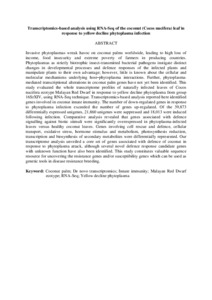Citation
Nejat, Naghmeh and Cahill, David M. and Vadamalai, Ganesan and Ziemann, Mark and Rookes, James and Naderali, Neda
(2015)
Transcriptomics-based analysis using RNA-Seq of the coconut (Cocos nucifera) leaf in response to yellow decline phytoplasma infection.
Molecular Genetics and Genomics, 290 (5).
pp. 1899-1910.
ISSN 1617-4615; ESSN: 1617-4623
Abstract
Invasive phytoplasmas wreak havoc on coconut palms worldwide, leading to high loss of income, food insecurity and extreme poverty of farmers in producing countries. Phytoplasmas as strictly biotrophic insect-transmitted bacterial pathogens instigate distinct changes in developmental processes and defence responses of the infected plants and manipulate plants to their own advantage; however, little is known about the cellular and molecular mechanisms underlying host–phytoplasma interactions. Further, phytoplasma-mediated transcriptional alterations in coconut palm genes have not yet been identified. This study evaluated the whole transcriptome profiles of naturally infected leaves of Cocos nucifera ecotype Malayan Red Dwarf in response to yellow decline phytoplasma from group 16SrXIV, using RNA-Seq technique. Transcriptomics-based analysis reported here identified genes involved in coconut innate immunity. The number of down-regulated genes in response to phytoplasma infection exceeded the number of genes up-regulated. Of the 39,873 differentially expressed unigenes, 21,860 unigenes were suppressed and 18,013 were induced following infection. Comparative analysis revealed that genes associated with defence signalling against biotic stimuli were significantly overexpressed in phytoplasma-infected leaves versus healthy coconut leaves. Genes involving cell rescue and defence, cellular transport, oxidative stress, hormone stimulus and metabolism, photosynthesis reduction, transcription and biosynthesis of secondary metabolites were differentially represented. Our transcriptome analysis unveiled a core set of genes associated with defence of coconut in response to phytoplasma attack, although several novel defence response candidate genes with unknown function have also been identified. This study constitutes valuable sequence resource for uncovering the resistance genes and/or susceptibility genes which can be used as genetic tools in disease resistance breeding.
Download File
![[img]](http://psasir.upm.edu.my/46764/1.hassmallThumbnailVersion/Transcriptomics-based%20analysis%20using%20RNA-Seq%20of%20the%20coconut%20%28Cocos%20nucifera%29%20leaf%20in%20response%20to%20yellow%20decline%20phytoplasma%20infection.pdf)  Preview |
|
Text (Abstract)
Transcriptomics-based analysis using RNA-Seq of the coconut (Cocos nucifera) leaf in response to yellow decline phytoplasma infection.pdf
Download (107kB)
| Preview
|
|
Additional Metadata
Actions (login required)
 |
View Item |

